World Mental Health Day: Let’s Talk About What Works


August 28, 2025
Understanding the Purpose Behind the Annual Observance
World Mental Health Day, observed on October 10 each year, serves as a vital platform to raise global awareness about mental health issues. It mobilizes efforts across governments, communities, and organizations to foster understanding, reduce stigma, and promote the importance of mental well-being. Each year, a specific theme directs these efforts towards particular aspects of mental health, with 2024 focusing on
The Significance and Background of World Mental Health Day
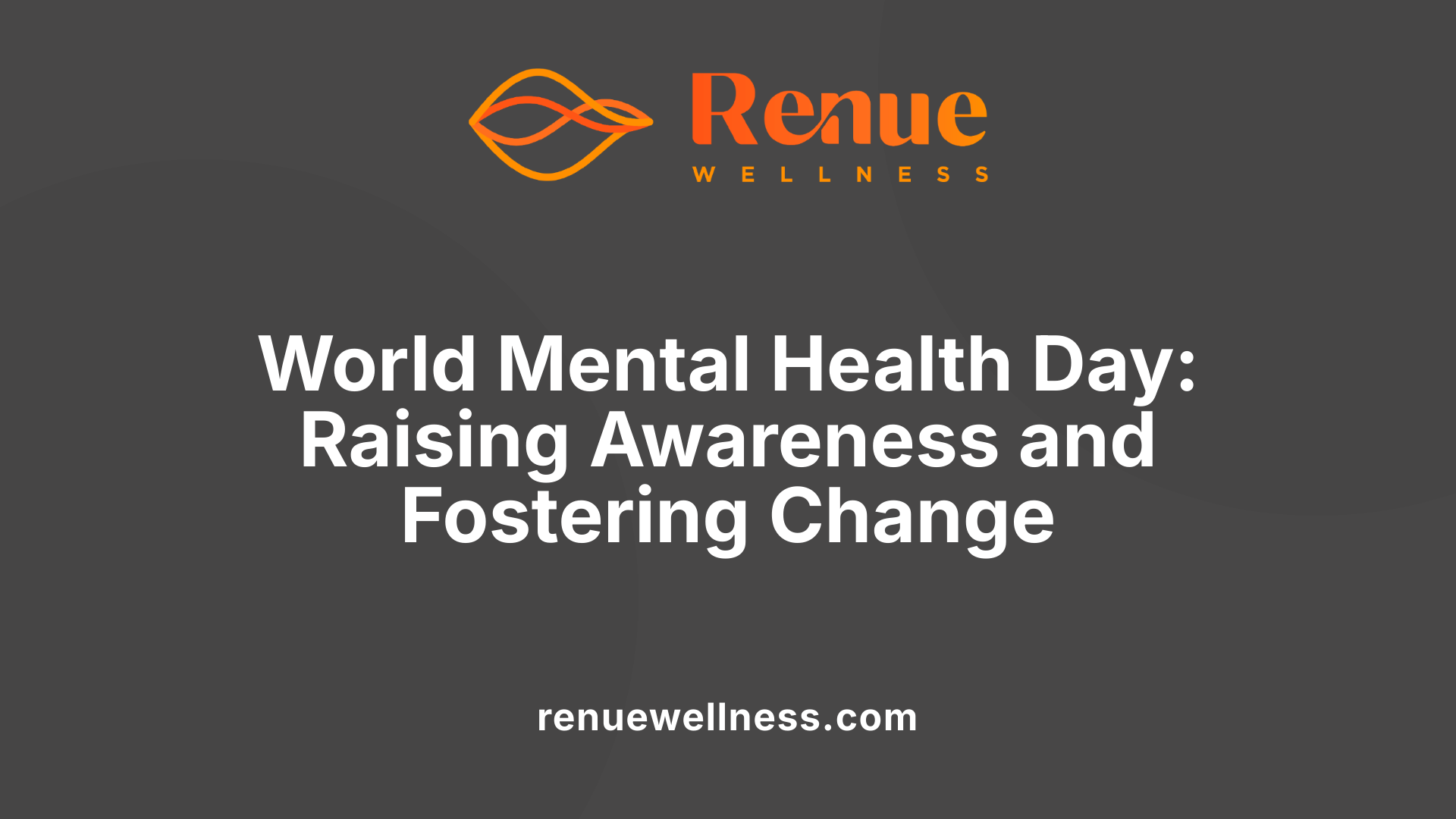
What is the purpose of World Mental Health Day?
World Mental Health Day, observed annually on October 10, serves as a global platform to raise awareness about mental health issues and foster understanding and support for affected individuals. Its primary goal is to mobilize action across countries, communities, and organizations to improve mental health care services, combat stigma, and promote well-being.
Each year, the day adopts a specific theme to highlight critical areas requiring attention. For 2024, the theme is 'Mental Health at Work,' emphasizing the importance of nurturing mental health within professional environments. The United Nations, along with the World Health Organization (WHO), organizes various campaigns and activities throughout October to champion mental well-being.
This day also underscores mental health as a universal human right. It encourages stakeholders—from governments to workplaces and individuals—to prioritize mental health, foster inclusive environments, and support effective policies. Overall, World Mental Health Day offers an opportunity to unify efforts in tackling mental health challenges worldwide and to advocate for accessible, equitable mental health services.
How have the themes evolved over recent years?
Over recent years, the themes for World Mental Health Day have reflected emerging issues and shifting focuses within mental health advocacy. In 2021, the theme was 'Mental Health in an Unequal World,' addressing disparities exacerbated by social and economic inequalities.
In 2022, the focus was on making mental health a global priority with the theme 'Make mental health for all a global priority.' The emphasis was on removing barriers to access and promoting mental health as a fundamental aspect of overall health.
The 2023 theme centered on 'Mental Health is a Universal Human Right,' reinforcing the necessity for equitable, stigma-free access to mental health resources worldwide. Celebrations marked the 75th anniversary of the World Federation for Mental Health (WFMH), highlighting over 100 initiatives across 30 countries.
For 2024, the theme 'Mental Health at Work' is particularly timely, aligning with the growing recognition of workplace environments as vital to mental health. It also responds to data showing that approximately 60% of the global population is employed, and stress-related mental health issues lead to billions of lost workdays annually. These evolving themes reflect an ongoing commitment to addressing mental health from varied angles—social justice, human rights, and workplace well-being.
Campaigns and Initiatives by WHO and UN
The WHO has been actively organizing global campaigns for World Mental Health Day since 2013. Each year, these campaigns focus on different aspects of mental health, incorporating awareness-raising activities such as sharing social media graphics, posters, and hosting community events.
The UN emphasizes creating inclusive, sustainable work environments through its System Mental Health and Well-being Strategy for 2024 and beyond. This strategy promotes prevention of risks, well-being promotion, and support for personnel with mental health conditions. During October, the UN organizes specific activities, including discussions on family support initiatives across its system, emphasizing the importance of collective responsibility.
Both organizations collaborate with various stakeholders—governments, workplaces, civil society—to develop holistic solutions. Evidence-based resources such as WHO guidelines, fact sheets, and policy briefs are widely distributed to inform strategy and action.
Understanding the Broader Impact
Mental health issues such as depression and anxiety are responsible for significant societal and economic costs. Globally, around 15% of working-age adults experience mental health conditions, affecting productivity and personal lives.
Statistics reveal that depression and anxiety cause the loss of about 12 billion workdays annually, costing the world economy around $1 trillion in lost productivity. This reinforces the urgent need for workplace initiatives that protect and promote mental health.
Work environments can foster better mental health by offering financial stability, inclusive communities, and a sense of achievement. Leadership that models openness about mental health and encourages dialogue can significantly reduce stigma.
Furthermore, accessible mental health services are crucial. WHO provides detailed guidelines and toolkits aimed at integrating mental health support into workplaces and broader community settings.
Resources and Support Systems
Numerous resources exist to support mental health awareness and action. For example, in the United States, the 988 Suicide & Crisis Lifeline provides immediate help, while organizations like the Mental Health First Aid USA have trained over 4.5 million mental health supporters.
Support services extend beyond crisis lines, including the SAMHSA’s National Helpline, and specialized programs addressing issues like sexual assault and trauma.
Public awareness campaigns frequently encourage sharing personal stories, advocating for mental health, and participating in community events to foster a culture of openness and support.
Promoting Conversations and Reducing Stigma
Talking openly about mental health is one of the most empowering actions individuals can take. Tips for effective conversations include choosing trustworthy people, selecting appropriate settings, and preparing for different reactions.
Supporting someone in distress involves active listening, offering reassurance, and asking how best to provide assistance. For those struggling, seeking help from available resources—like counseling services or crisis hotlines—is vital.
Organizations like the World Federation for Mental Health and national groups continue to advocate for destigmatization and increased access to care. Their global campaigns involve sharing success stories, arts, and voices from workplaces, all aimed at normalizing mental health discussions.
Focus for 2025
Looking ahead, the 2025 theme set by the World Federation for Mental Health is 'Access to Services,' with special attention to mental health during catastrophes and emergencies. This underlines the importance of resilient mental health support systems in crisis situations.
By connecting awareness efforts with tangible improvements in service delivery, the ongoing campaigns seek to build a future where mental health is prioritized, protected, and accessible for all.
The Central Theme of 2024: Mental Health at Work
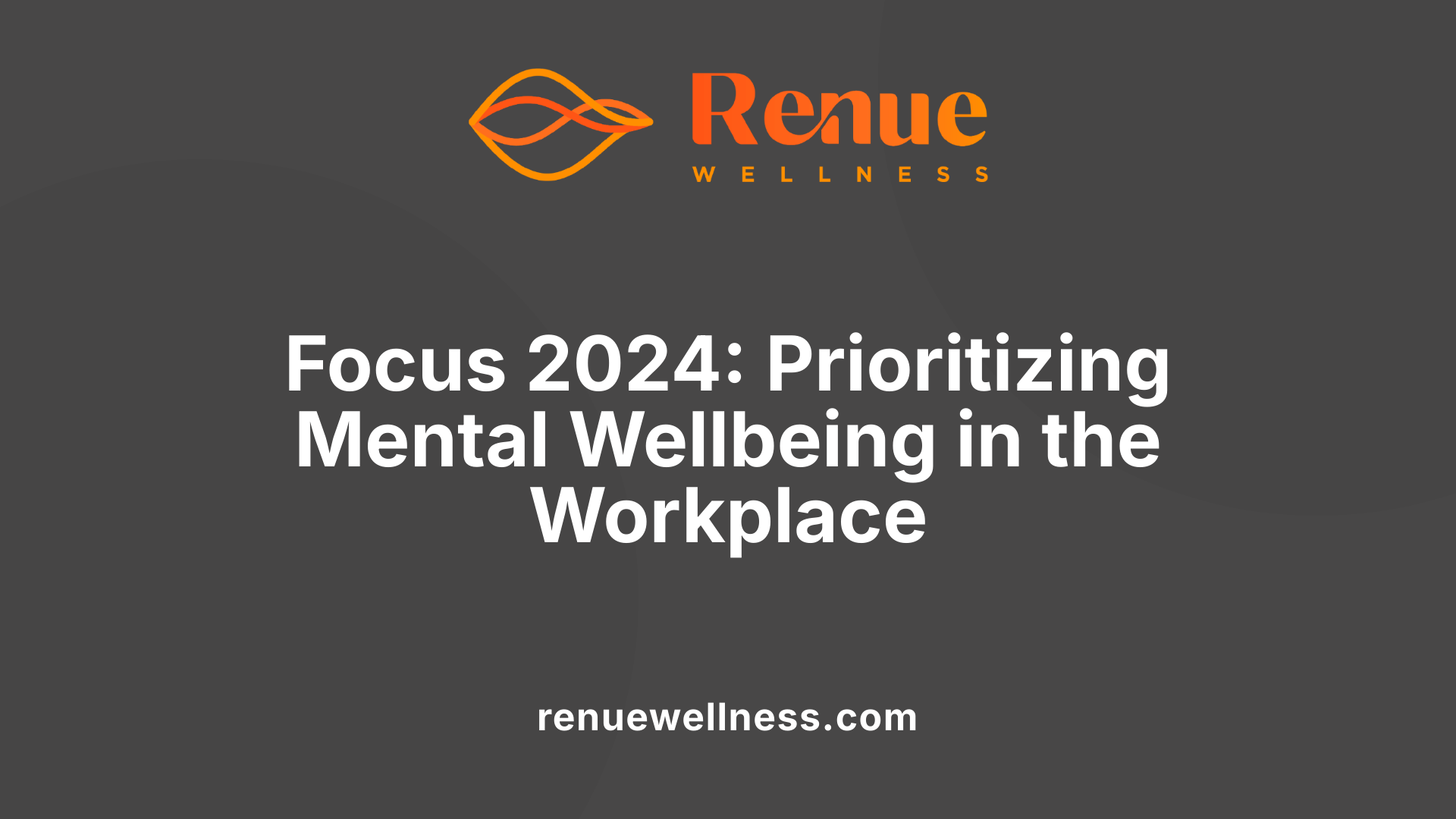
Why is mental health at work so important?
Mental health in the workplace is a vital concern because the working environment directly impacts employees' overall well-being. Unhealthy conditions such as stigma, discrimination, harassment, and poor physical work environments can significantly harm mental health. According to the World Health Organization (WHO), roughly 60% of the world’s population is employed, and mental health conditions like depression and anxiety are responsible for the loss of approximately 12 billion workdays every year.
The economic toll is substantial, with losses estimated at around $1 trillion annually due to decreased productivity caused by mental health issues. Beyond economics, poor mental health affects personal lives, leading to negative health outcomes and strained relationships. Supportive and inclusive workplaces can mitigate these risks by providing financial stability, fostering a sense of community, offering opportunities for achievement, and creating a secure and routine environment.
Promoting mental wellness at work not only benefits individual employees but also enhances overall organizational effectiveness and societal resilience. Leaders are encouraged to set examples by openly discussing mental health, thus reducing stigma. Creating safe, supportive workspaces is essential for improving mental well-being, which ultimately contributes to a healthier, more productive society.
What initiatives and policies support mental health in workplaces?
Various organizations and governments are actively promoting policies and programs to improve mental health at work. The WHO, in partnership with the United Nations, has developed guidelines, policy briefs, and resources such as mental health first aid training, which has trained over 4.5 million individuals in the U.S. alone.
The United Nations System Mental Health and Well-being Strategy for 2024 aims to foster inclusive, sustainable working environments by focusing on prevention and well-being promotion. Key elements include risk assessment, supportive measures, and inclusion of mental health support as part of overall employee welfare strategies.
Employers are encouraged to implement reasonable accommodations, provide mental health training for managers and staff, and foster a culture where open dialogue about mental health is normalized. Policies should prioritize reducing stigma, improving access to mental health resources, and supporting employees facing mental health challenges.
Collaboration between governments, stakeholders, and organizations is crucial to designing comprehensive policies that address mental health risks, facilitate recovery, and embed mental health support within broader workplace wellness programs.
How do work environments influence mental well-being?
Work environments play a significant role in mental health outcomes. Healthy workplaces provide safety, inclusion, and emotional support, which help reduce stress and prevent mental health issues.
Conversely, unhealthy environments characterized by high stress, poor communication, lack of recognition, and harassment contribute to anxiety, depression, and burnout. The WHO highlights that work-related stress affects more than three-quarters of employees, with many reporting negative impacts on their physical health and personal relationships.
To foster positive environments, organizations should promote transparency, provide opportunities for employee feedback, and ensure that mental health support is readily accessible. Initiatives like Team-building activities, mental health days, and routine mental health assessments can help maintain a healthy balance.
Strategies for employers and employees to foster supportive work settings
Employers can start by modeling vulnerability and encouraging open conversations about mental health. Implementing training programs, establishing Employee Assistance Programs (EAPs), and creating clear channels for support are effective steps.
Employees, on their part, are encouraged to manage stress proactively—seeking support when needed, practicing mindfulness, and engaging in self-care activities. Building peer support networks can also reduce feelings of isolation.
Government and stakeholder involvement are necessary to develop policies that make mental health resources accessible and destigmatize seeking help. Initiatives such as mental health awareness campaigns, educational workshops, and community events like 'Tea & Talk' are valuable.
Summarizing the importance of workplace mental health
Reducing the economic and social costs linked to poor mental health requires concerted efforts. Protecting mental health at work involves a whole-system approach—support from leadership, effective policies, inclusive environments, and individual proactive behaviors.
The upcoming World Mental Health Day on October 10, 2024, will underscore these points, emphasizing that it is time to prioritize mental health in every workplace. As we move further into 2024, the focus on 'Mental Health at Work' continues to grow, fostering healthier, more resilient organizations and societies.
Activism and Engagement: How to Participate in Mental Health Campaigns
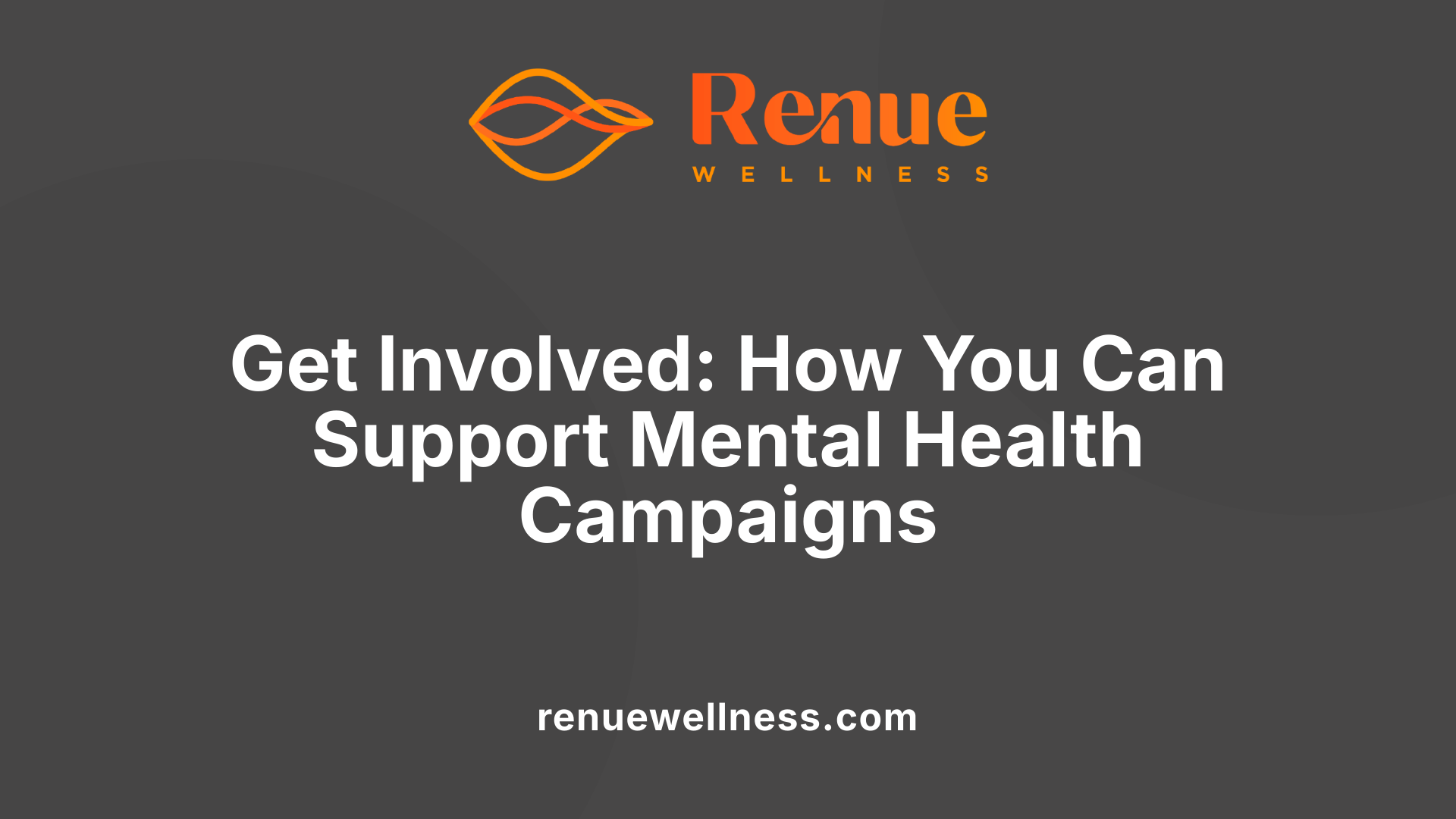
How can individuals support mental health awareness campaigns?
Individuals play a vital role in amplifying mental health awareness. One effective way is through sharing personal stories, either by posting on social media, creating videos, or writing narratives that humanize mental health issues. Using hashtags such as #MyMentalHealth or #MHAM2025 helps reach broader audiences, reduce stigma, and foster understanding.
Participating in community activities like walks, runs, or fundraising events dedicated to mental health causes can also make a difference. Volunteering with organizations that support mental health—whether through mentoring, advocacy, or event organization—further creates impact.
Advocacy efforts aimed at influencing policies or supporting legislative change are crucial. Supporting or joining support groups allows people to connect and reinforce mutual encouragement.
Educational resources offered by agencies like SAMHSA (Substance Abuse and Mental Health Services Administration) and NAMI (National Alliance on Mental Illness) are excellent tools to promote understanding and action. Attending workshops, webinars, and open dialogues not only educates but also helps build resilience within communities.
Overall, collective efforts in sharing stories, advocating for better policies, and accessing resources can foster an environment where mental health is prioritized and destigmatized.
What activities or initiatives promote awareness on World Mental Health Day?
On World Mental Health Day, various activities are organized worldwide to raise awareness and promote dialogue about mental health. Sharing posters, infographics, and social media graphics that highlight mental health facts and personal stories spreads awareness broadly.
Initiatives like 'Tea & Talk' are popular—they encourage informal conversations about mental health, which helps normalize these discussions. Community events such as seminars, panel discussions, or mindfulness workshops foster education and openness.
Organizations often host webinars or training sessions focusing on mental health literacy, emphasizing the importance of recognizing symptoms and seeking help.
Campaigns work towards dispelling myths about mental illnesses, promoting inclusivity, and advocating for policy changes that improve access to mental health services.
By providing accessible resources and creating safe spaces for conversations, these activities aim to reduce stigma and empower individuals. The message is clear: understanding and support are essential.
How can participating in campaigns impact mental health awareness?
Engagement in these initiatives helps build a supportive environment where mental health is discussed openly. Sharing stories and participating in community events destigmatize mental health conditions.
The visibility of these campaigns encourages more individuals to seek help without fear of judgment. It also educates the public about available resources, such as hotlines, counseling services, and support groups.
As more people get involved, the collective effort creates momentum for policy improvements and resource allocation at local, national, and global levels.
Resources for Supporting Mental Health Campaigns
Organizations provide many tools and materials to assist in advocacy. For example, posters, social media templates, and informational graphics are available from official platforms.
Additionally, many campaigns promote volunteer opportunities and ways to participate in events, both online and in person.
Promoting these resources helps amplify messages of hope, understanding, and action. It's about creating a culture where mental health is prioritized and no one feels alone.
| Activity Type | Description | How to Get Involved |
|---|---|---|
| Sharing personal stories | Use social media or blogs to humanize mental health issues | Post on platforms using relevant hashtags |
| Community events | Participate in walks, talks, or fundraisers | Join local or virtual initiatives |
| Educational campaigns | Distribute posters, graphics, and participate in webinars | Access resources from mental health organizations |
| Support and advocacy efforts | Volunteer or advocate for policy change | Connect with local mental health groups |
| Workplace initiatives | Promote awareness and support at work | Organize or participate in workplace-related activities |
Engagements like these reinforce the importance of mental health in all aspects of life, fostering compassionate, well-informed communities ready to support those in need.
Themes and Focus Areas Over Recent Years
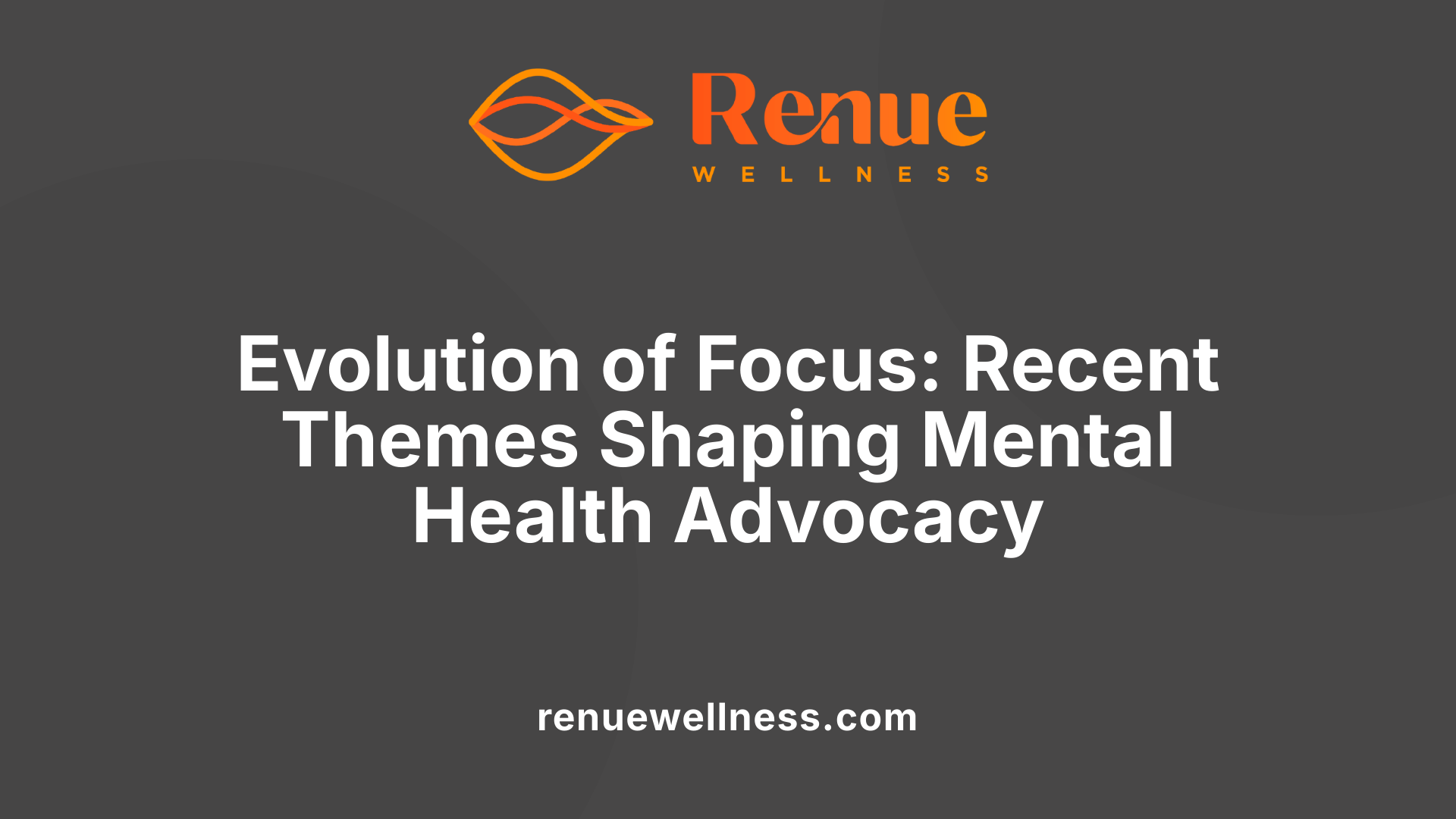
What are the themes associated with recent years' World Mental Health Day?
Each year's World Mental Health Day has spotlighted different aspects of mental health, reflecting evolving priorities and societal needs. In 2021, the theme was 'Mental Health in an Unequal World,' which emphasized disparities in access to mental health care and the social justice aspects linked to mental well-being. This theme called for recognition of inequalities and promoted efforts to bridge the gap.
The following year, 2022, adopted the theme 'Make mental health for all a global priority.' This broad message aimed to push governments, organizations, and communities to place mental health at the forefront of health and social initiatives, advocating universal access and action.
In 2023, the focus shifted to 'Mental health is a universal human right.' This underscored the importance of equitable treatment and the fundamental right of everyone to mental health services, reinforcing the need for systemic change worldwide.
For 2024, the theme is 'Mental Health at Work,' highlighting the critical role of employment environments in mental health. It emphasizes that workplaces are key settings where mental health issues can be addressed through better policies, supportive cultures, and inclusive practices.
These themes collectively illustrate a progression from addressing disparities and rights toward systemic changes in various societal sectors, culminating in a current focus on the workplace.
Why is recent focus on workplace mental health important?
Prioritizing mental health at work is crucial because the workplace significantly influences overall well-being. Poor working conditions, including stigma, discrimination, harassment, and unaddressed stress, heighten risks for mental health problems.
With over half of the global population engaged in employment, the impact of mental health issues extends beyond individual struggles. Depression and anxiety, which are common mental health conditions, are responsible for the loss of approximately 12 billion workdays annually, costing the global economy about $1 trillion in productivity.
Research and reports from organizations like the WHO show that unhealthy work environments contribute to chronic stress, burnout, and social difficulties, affecting personal health and relationships. Addressing these issues through supportive measures and inclusive policies is essential to foster healthier, more productive workplaces.
Employers are encouraged to create environments that promote mental well-being by providing accommodations, mental health training, and fostering open dialogues about mental health. Governments, organizations, and stakeholders must collaborate to develop holistic strategies that enhance employee support systems.
This focus on work recognizes that systemic change in employment practices not only improves individual health but also benefits societal resilience and economic stability. It underscores the understanding that mental health is a vital component of overall health, requiring proactive and sustained effort in professional settings.
Overview of Theme Evolution and Strategic Approach
| Year | Theme | Focus | Significance | Additional Details |
|---|---|---|---|---|
| 2021 | Mental Health in an Unequal World | Disparities and social justice | Highlighted inequalities in access and treatment | Focused on global social disparities |
| 2022 | Make mental health for all a global priority | Universal access and action | Urged widespread prioritization | Emphasized systemic change |
| 2023 | Mental health is a universal human right | Rights and equity | Reinforced importance of accessible care | Advocated for global policy reforms |
| 2024 | Mental Health at Work | Workplace environment | Recognized employment as a key factor | Directed attention to employer roles |
Understanding this progression illuminates the broadening scope of mental health advocacy—from social justice to systemic transformation, and now, workplace engagement. It shows a strategic evolution aimed at comprehensive societal well-being, emphasizing that mental health support must be integrated across all domains of life.
The Role of Global and National Organizations in Promoting Mental Health
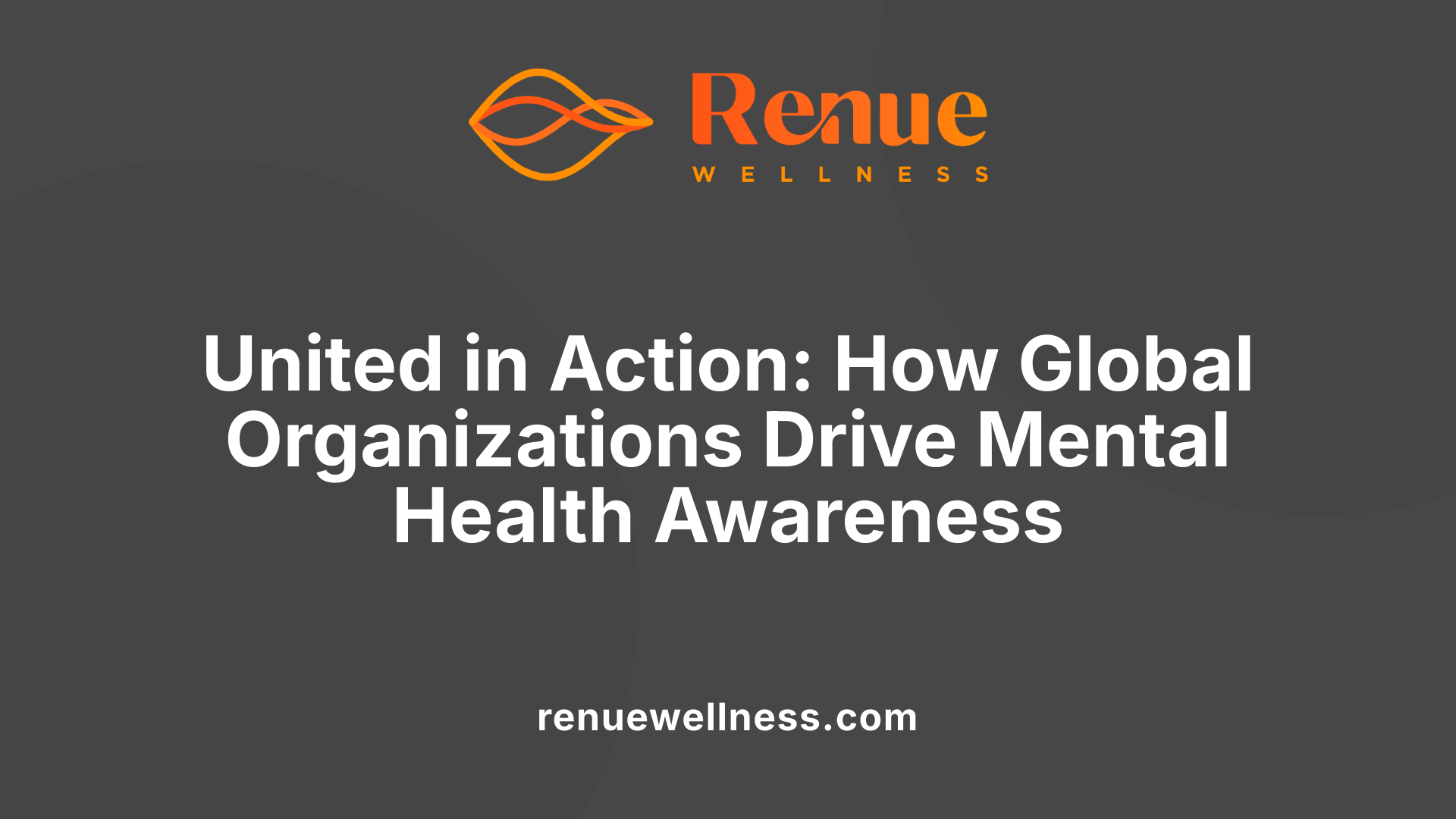
How do organizations like WFMH, WHO, and the UN support mental health awareness?
These organizations have been instrumental in raising awareness about mental health issues across the globe. The World Federation for Mental Health (WFMH), founded in 1948, has played a pivotal role by organizing worldwide campaigns, sharing initiatives across different countries, and celebrating milestones, such as its 75th anniversary in 2023. These efforts help normalize mental health conversations and combat stigma.
The World Health Organization (WHO), which has been leading global campaigns since 2013, develops comprehensive materials like guidelines, policy briefs, and educational campaigns. In 2024, WHO’s focus is on mental health at work, emphasizing systemic strategies to improve workplace environments.
The United Nations (UN) actively involves itself through strategic plans, including the UN System Mental Health and Well-being Strategy for 2024. The UN promotes inclusive, sustainable workspaces and supports community-based initiatives, organizing events like Family Support initiatives during World Mental Health Day. These efforts highlight the importance of holistic health and stress the need for international collaboration.
Together, these organizations work synergistically, leveraging their platforms to broadcast messages, influence policy change, and prioritize mental health in global health agendas. Their efforts create a unified front to reduce stigma, educate the public, and promote accessible mental health services.
What tangible impacts have these organizations made recently?
Recent impacts from these organizations demonstrate tangible progress in supporting mental health worldwide. WHO’s initiatives include the creation of guidelines and policy briefs aimed at integrating mental health support into workplaces worldwide. These resources guide employers and policymakers in developing supportive environments.
The WFMH’s 2023 Impact Report highlighted over 100 initiatives across 30 countries, showcasing diverse efforts like awareness campaigns, community programs, and advocacy. Celebrations like the 75th anniversary brought increased attention and funding toward global mental health promotion.
The UN’s initiatives, including organizing Family Support programs and awareness events such as the one planned for October 11, foster community engagement and destigmatization. These combined efforts have enhanced awareness, expanded access to resources, and strengthened policies to support mental health.
The collaboration among these organizations has also facilitated the development of a global mental health movement that encourages governments, workplaces, and individuals to prioritize emotional well-being and mental resilience. These impacts collectively contribute to a more inclusive society that recognizes mental health as fundamental to overall well-being.
| Organization | Recent Impact | Notable Initiatives | Additional Details |
|---|---|---|---|
| World Federation for Mental Health (WFMH) | Over 100 initiatives showcased in 2023 | 75th Anniversary celebrations, global awareness campaigns | Promotes mental health through international advocacy and initiative sharing |
| World Health Organization (WHO) | Developed guidelines and policy briefs | Focused on mental health at work, global campaigns since 2013 | Provides actionable resources for policy and workplace health |
| United Nations (UN) | Organized awareness and support events | Family Support initiatives, strategic mental health plans | Emphasizes inclusive, sustainable mental health policies |
How do these efforts translate into actual change?
The combined work of these organizations translates into tangible societal benefits—reduced stigma, increased access to services, and more supportive work environments. Initiatives like the WHO’s guidelines help companies implement mental health-friendly policies, while the WFMH’s campaigns foster cultural change.
The UN promotes community involvement and destigmatization, encouraging a more open dialogue around mental health. These efforts support individuals in seeking help and foster resilience at personal, organizational, and community levels.
In summary, the collaborative work of WFMH, WHO, and the UN exemplifies a strategic multi-level approach, influencing policy, promoting awareness, and fostering a culture of openness and support around mental health issues worldwide.
Conclusion: Toward a More Supportive Future for Mental Health
The significance of collective action and advocacy is fundamental in transforming how society approaches mental health. World Mental Health Day plays a crucial role in rallying individuals, organizations, and governments around the shared goal of fostering understanding and reducing stigma. By highlighting the importance of inclusive, supportive environments—whether in workplaces, communities, or policy frameworks—the day encourages sustained efforts toward systemic change.
Ongoing initiatives, guided by global organizations like the World Federation for Mental Health (WFMH), the World Health Organization (WHO), and the United Nations, focus on integrating mental health into broader societal goals. Their campaigns and strategic plans aim to build awareness, promote accessible services, and influence policy reforms that prioritize mental well-being. For example, the UN's System Mental Health and Well-being Strategy for 2024 emphasizes prevention, promotion, and support, aiming to create work environments that are inclusive and sustainable.
Long-term advocacy enhances the impact of these efforts by embedding mental health into societal norms. It encourages continuous investment in mental health infrastructure, research, and education, leading to reduced stigma and better access to care. When organizations adopt enduring practices—such as employee support programs, mental health training, and policies that challenge discrimination—they foster resilient communities that value mental well-being.
Additionally, long-term advocacy helps normalize conversations about mental health, making it easier for individuals to seek help without fear of judgment. Initiatives like Mental Health First Aid, which has trained over 4.5 million people in the U.S., exemplify how ongoing education can empower communities.
The theme for 2024, ‘Mental Health at Work,’ underscores the importance of workplaces as pivotal sites for ongoing change. By promoting mental health support, reducing stress, and advocating for inclusive environments, organizations can significantly contribute to societal resilience. As more stakeholders collaborate—employers, governments, and individuals—the ripple effect can foster healthier workplaces and communities.
Looking ahead, the future of mental health advocacy is poised to expand through innovative solutions, digital platforms, and integrated policies. The ongoing efforts aim to address not only the immediate needs but also root causes of mental health challenges, including social inequality, stigma, and environmental stressors. Ultimately, sustained advocacy and collective commitment will create a society where mental health is recognized as a fundamental right, and necessary resources are accessible to all.
In conclusion, the continuous push for awareness, policy change, and community support—driven by annual campaigns like World Mental Health Day—paves the way for a more compassionate, inclusive future. This enduring momentum ensures that mental health remains at the forefront of societal priorities, fostering a world where everyone can thrive, both personally and professionally.
Building Hope and Action for Better Mental Health
As we observe World Mental Health Day 2024 with the theme ‘Mental Health at Work,’ the emphasis on supportive, inclusive workplaces underscores a broader societal commitment to mental well-being. The collaboration between global organizations like WHO, UN, and WFMH demonstrates the importance of coordinated efforts to destigmatize mental health issues and promote effective support systems. By sharing stories, participating in campaigns, and implementing supportive policies, individuals and organizations play vital roles in fostering environments where mental health is prioritized and protected. The path forward involves sustained advocacy, systemic change, and collective action, ensuring that mental well-being remains a fundamental human right for all.
References
- World Mental Health Day | United Nations
- World Mental Health Day 2024 - World Health Organization (WHO)
- World Mental Health Day 2025
- 2024 World Mental Health Day: Let's talk about… - UN Web TV
- World Mental Health Day is October 10 - UConn Today
- Ten Ways To Take Action This World Mental Health Day
- World Mental Health Day – October 10th
Recent Posts
Conditions Treated
AnxietyDepressionOCDPTSDPostpartum DepressionPain ManagementSubstance AbuseSuicidal IdeationOur Location


